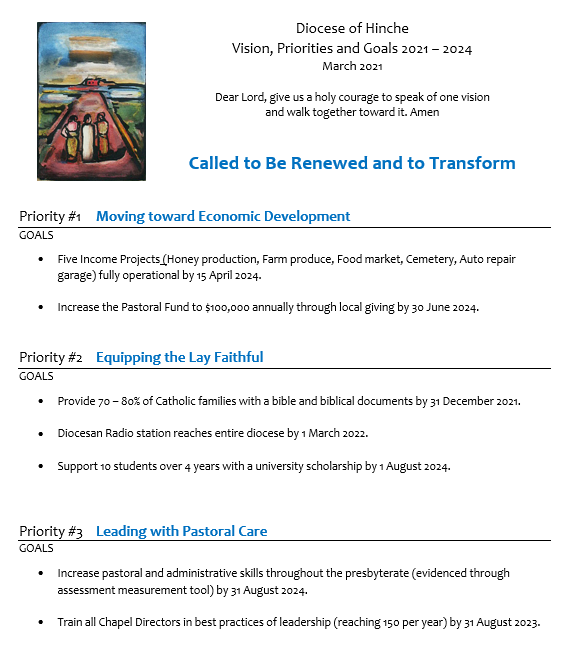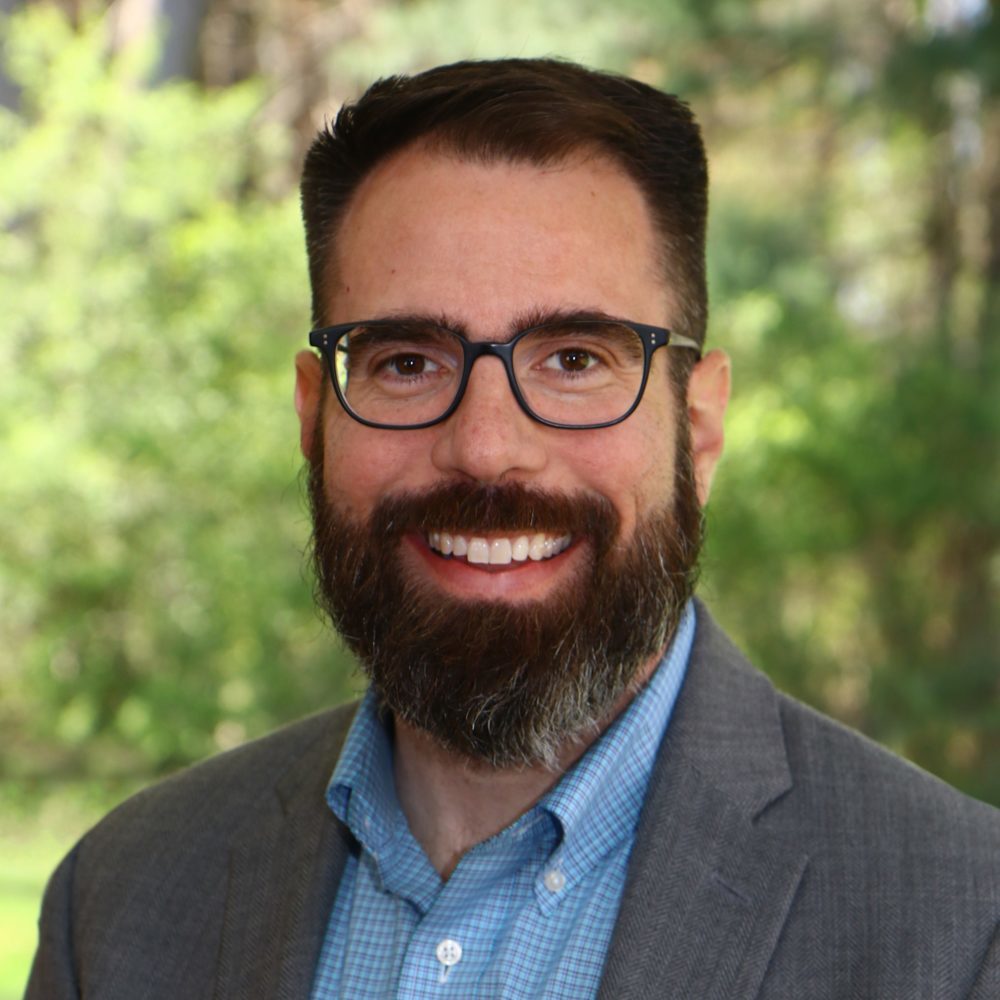CLI in the Diocese of Hinche, Haiti
Friends, it is a privilege to share this three-part story of global ministry with you.
In January 2021, Catholic Leadership Institute began a unique mission to support a Caribbean diocese, a journey that still continues today. The Diocese of Hinche, Haiti, covers 3,000 square kilometers and over half of its 759,000 inhabitants are Catholic. The diocese includes fifty parishes and many small missions (called chapels), often located far from the parish and only accessible by dirt roads, making it difficult for the diocese’s 100 priests to serve all regularly.
With 380,000 Catholics and 100 priests in mind, Bishop Desinord Jean, CLI Leadership Consultant, Barbara Eckert, and a team of five priests went to work thanks to the generous support of CLI Board member Drew Peloubet and his wife Susan. They became (and are still) a small community of faith, dedicated to prayer, planning, and implementation.
This story is too beautiful to tell in just one email. Over three emails, I will share the viewpoint of three people, united by a common goal and common love for our Lord:
- Today: experience the perspective of CLI’s Leadership Consultant Barb as she serves this diocese
- Next Thursday: hear from Bishop Desinord Jean about the importance of this mission and his trust in Catholic Leadership Institute
- September 29: learn about why Drew and Susan Peloubet felt called to support and serve this partnership between CLI and the Diocese of Hinche.
SCROLL DOWN to read more about Barb’s rewarding experience, CLI’s ability to adapt and pivot to the needs of those we serve in the Church, and the fruits of our planning work with the diocese (next week, Bishop Jean will tell you more!).
Story 1 of 3 – Barb Eckert Serves the Diocese of Hinche, Haiti
In 2021, CLI Leadership Consultant Barb Eckert launched a strategic planning process for the Diocese of Hinche in Haiti. It is a service she has led many times from Florida to New York, Idaho to Texas, Missouri to Canada. This time was different: she didn’t speak the language; she was never in the same room with the bishop and his team, and the socio-economic-political reality of the diocese could have been a devastating undertow.
A Blessed Bishop. A Pastoral Plan.
At the same time, she heard a unique voice, Bishop Desinord Jean, saying, “we need to draw closer to our people.” Whatever needs and obstacles there were, the people remained faithful and focused. The Church in Hinche was asking “What can we do?” The challenges were great; yet, Barb knew she was being called by our Lord to be a part of this journey.
Bishop Desinord Jean wrote a detailed pastoral letter in 2016 outlining the historical - socio– economic-cultural and spiritual conditions of the diocese. He recognized a “spiritual void” in the lived reality of many Haitians. He was determined that parishioners, priests, and all parish leaders be better formed and more capable of leading in pastoral ways. At the same time, the ability of the diocese to support her people was hampered by its own lack of resources. The two elements would have to be worked-on together.
“I saw such similarities to other bishops,” Barb said of Bishop Jean’s hopes to renew and transform his diocese. “Under the calm exterior, he has an urgency to lead people to God’s Word and sacrament and build a stronger foundation of faith in people’s lives.” The question was how to make this possible against the realities of the diocese.
“Making it Work” for Our Lord
One of Barb’s first takeaways from meeting with Bishop Jean and the priests (virtually), was the immense “good spirit” and a desire to “make it work.” While making it work would ultimately touch the long-term outcomes they were meant to find, it also meant the process of working together.
“Making it work” meant navigating Haiti’s inconsistent infrastructure, including unreliable broadband and electricity. It meant coordinating across time zones, and more, importantly, strategically planning meetings on back-to-back days (an afternoon and then a morning) so the priests could avoid traveling on the increasingly dangerous roads after dark. Only Bishop Jean and Barb could speak together without a translator (as Barb speaks neither French nor Haitian Creole), so a translator (virtually) came. The workbook, slides, in session work, meeting notes and emails had to be translated, ahead, in real time and post meetings.
“The first session I wanted to be clear that they were the experts on their diocese, culture, and country,” Barb recalled. “My role was to help them discern, synthesize and commit.” Cross-cultural communication was evident in laughter and smiles. “It was clear we were in this work together as people, as Catholics, as leaders capable of rolling with the challenges,”
Ten Weeks; Three Unique Priorities.
Over the course of ten weeks, Barb met with Bishop Jean and five priests to develop priorities and strategies for the diocese. They agreed upon three priorities: moving toward Economic Development, Equipping the Lay Faithful, & Leading with Pastoral Care.
Below is a snapshot of their plan:

Barb’s role as consultant was to lead them to clarity, specificity, and prioritization of goals. “One of the ways we lead at CLI,” she remarked, “is transforming good ideas into concrete objectives; that is ‘What are we going to accomplish and what will it take?’”
A remarkable aspect of the plan (under the economic development priority), is the five income projects: planting moringa trees for honey production, growing farm produce on parish lands, establishing a food market (lessening trips to larger cities), building a Catholic cemetery (the first in Hinche), and an auto repair shop. These projects were strategically chosen as long-term sources of income for the diocese as well as projects that would benefit the lives of people through agriculture and employment. Projects like tree farms, honey and beeswax candle production and other produce will initially take time but will be sustainable. A priest trained as an agronomist is overseeing this work. (The new crest of the diocese for its 50th anniversary year in 2022 includes a moringa leaf and bee.)
The Catholic cemetery, under construction and due to open in coming months, will be a visible sign of the Church’s pastoral care.
Several goals have been impacted by the cascading uncertainties. The first five hundred moringa trees will be all that is available for the near future. So, they are pivoting to also plant moringa seeds. The outcome to provide every Catholic family with a bible by the end of last year was also obstructed by supply and transportation problems. The diocese pivoted to a distribution of breviaries to lay leaders, teaching them how to lead the liturgy of the hours and use the scripture contained therein. (The goal remains to provide Catholic bibles in Haitian Creole as well as a biblical resource.)
Even formation and training goals are affected. The first session for on-going formation of priests (in aspects of pastoral care, administrative skills, testimony and witnessing, canon law and more) were delayed because subject matter experts were unable/unwilling to safely travel in country. Transportation alternatives are in the works with a plan to hold sessions this October.
The diocese has been able to start the training of chapel directors (on sight leaders of the rural mission communities) because those who can teach are local. But this takes special planning. Those who serve in this capacity have no reserve - personally or through the parish – to pay for meals or transportation while they come to the diocesan center. The diocese plans and provides accordingly, they think of the impact on the chapel directors and their families.
Barb is impressed with Bishop Jean and the team’s focused effort. “They were quick to move to implementation and now they creatively meet obstacles in the path. They realize some of their goals are ambitious, and they can’t accomplish them all now, but they are faithfully working on what they can.” Goals for opening a diocesan radio station, offering partial scholarships for Catholic students (who would come back to work in the diocese in needed specialties) and starting an annual fund are slated for the future.
Barb was pleased by the on-going and thorough communication with diocesan priests from the beginning of the process through to the setting of goals: “There is a shared sense of responsibility to their vision ‘Called to Be Renewed and to Transform.’”
CLI has the privilege of working with many dioceses, bishops, and priests, but Barb’s work in Haiti as a leadership consultant was a unique experience. Being able to adapt and pivot to the needs of those we serve is a hallmark of CLI’s commitment to the Church in all of her diverse needs.
We are grateful to all who have participated in this special endeavor. Next week, I look forward to introducing you to Bishop Jean, who is a powerful communicator, dedicated shepherd, and devout man of God!
Our President & CEO Daniel Cellucci's weekly email, the DIAL: Discerning Insights About Leadership.
CLI serves Church leaders, helping them rediscover their potential and forming them to be more intentional with those they serve.
CLI helps empower and energize Catholic leaders by providing focus and courage to engage the culture with an apostolic mindset.
News and updates from Catholic Leadership Institute that highlight announcements within the organization, our team, or our partners.



